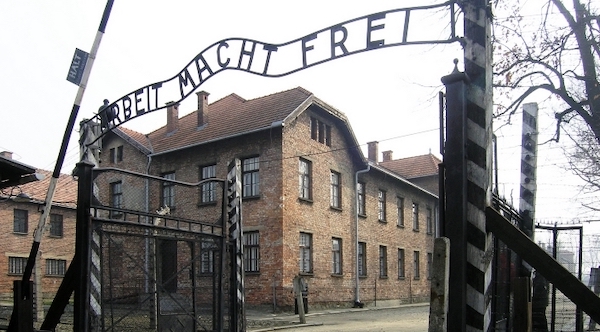It’s not easy for a politician to criticize a popular ex-president from his own party. That’s why it is significant that President Joe Biden this week strongly criticized the refusal of President Franklin D. Roosevelt to bomb the railways leading to Auschwitz in 1944. Biden has spoken of his admiration for FDR’s leadership during the Depression and World War II, but it’s important to be equally frank about a president’s failures.
President Biden spoke on May 16 at a White House event celebrating Jewish American Heritage Month. He said he first learned about the Holocaust when his father, a World War II veteran, spoke at the dinner table “about how outraged he was about why we didn’t bomb the railroad tracks into the concentration camps, why we didn’t let the ship in with Jewish [refugees], and he talked about the need to make sure every generation understood.”
As a result, Biden later took his own children to visit the former site of the Dachau concentration camp. “I want[ed] them to see how no one could pretend they didn’t know,” the president explained. “I wanted them to bear witness to the perils of indifference.”
Biden is not the first president to publicly acknowledge FDR’s abandonment of the Jews.
At the opening of the U.S. Holocaust Memorial Museum on April 22, 1993, President Bill Clinton said that even after America’s “awareness of [Nazi] crimes grew into indisputable facts, far too little was done” to help the Jews. “Before the war even started,” Clinton emphasized, “doors to liberty were shut, and even after the United States and the Allies attacked Germany, rail lines in the camps within miles of militarily significant targets were left undisturbed.”
President George W. Bush, viewing an aerial reconnaissance photo of Auschwitz at Yad Vashem on January 11, 2008, remarked, “We should have bombed it.” And President Barack Obama said on April 23, 2012, that the Nazis were able to carry out the Holocaust in part “because so many others stood silent.”
In the spring of 1944, American Jewish organizations received definitive information about Auschwitz and repeatedly urged Roosevelt administration officials to bomb the railway tracks and bridges over which hundreds of thousands of Hungarian Jews were being deported to the gas chambers.
U.S. officials responded that bombing the railways because it would require “diverting” planes from elsewhere in Europe. Even when Jewish leaders pointed out that the same railways over which Jews were deported were also being used for German military purposes, they still received the same answer: No.
Recently, some apologists for FDR’s Holocaust record have argued that there was no point in bombing the railways because the Germans sometimes could repair railway lines fairly quickly.
That Monday morning quarterback excuse ignores two crucial facts: the bridges along the railway routes were much more difficult to repair, and even though railroad tracks were sometimes repairable, that did not stop the Allies from making railways prime targets in their air war against the Germans.
No less than 32% of the bomb tonnage utilized in the Allies’ entire strategic air campaign in Europe was devoted to attacking railway routes. The impact was significant. The Nazis were compelled to divert tens of thousands of laborers from military construction in order to repair damaged railroads. Trains carrying military supplies were stranded, and war materials remained in warehouses because there was no way to get them to the front. Hitler’s Ardennes offensive (better known as the Battle of the Bulge) was repeatedly postponed because the damage inflicted on transportation routes prevented resupplying German troops there. The bombing of rail marshaling yards destroyed freight cars, locomotives, and military goods awaiting shipment.
The Allies’ destruction of rail centers, bridges, and railroad cars in Germany’s key coal-producing region, the Ruhr, drastically reduced coal production and stockpiles, which in turn crippled other industries. The U.S. government’s Strategic Bombing Survey found the destruction of the transportation routes “was the most important single cause of Germany’s ultimate economic collapse.”
The fact that American bombers were already attacking railways throughout Europe makes it clear why President Biden’s father was so “outraged” over the question of “why we didn’t bomb the railroad tracks into the concentration camps.”
The heart of the problem was that the Roosevelt administration was committed to the principle that military resources should never be used to assist Jewish refugees. President Biden, by contrast, appears to embrace the principle that the U.S. should use its military power to save lives when it can: recall that the Obama-Biden administration bombed Libya when Muammar Qadaffi was preparing to massacre civilians in 2011 and sent U.S. planes to break the ISIS siege of the Yazidi refugees in the mountains of Iraq in 2014.
With his remarks this week, President Biden, in effect, reaffirmed that he is determined not to repeat Roosevelt’s mistakes.
Dr. Medoff is the founding director of The David S. Wyman Institute for Holocaust Studies and the author of more than 20 books about Jewish history and the Holocaust. His most recent book, America and the Holocaust: A Documentary History, was published by the Jewish Publication Society of the America / University of Nebraska Press. And available on Amazon(as are his other books).






